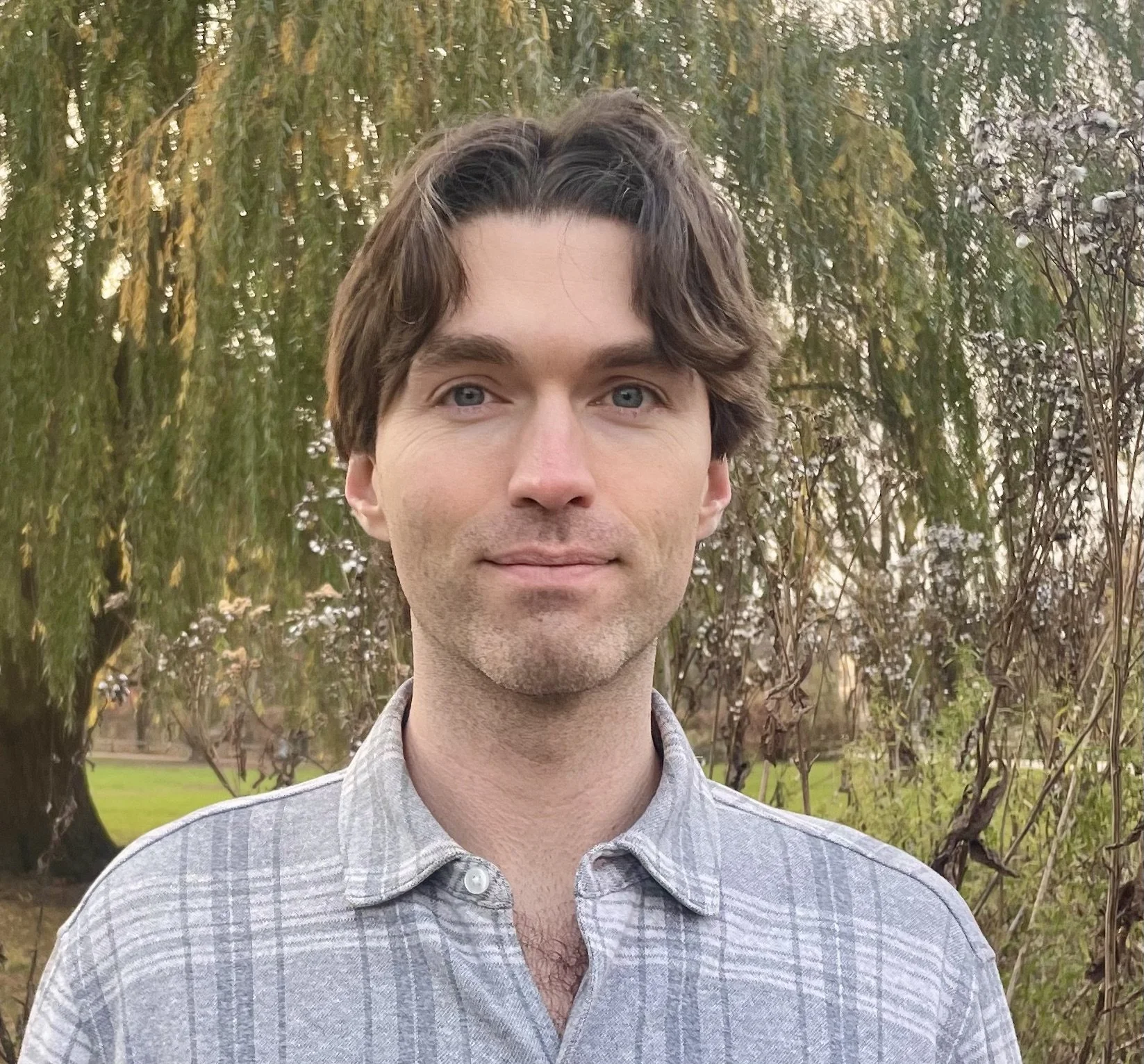“Remember that you are all people
and that all people are you.”
Joy Harjo
The Poems
Poems are best viewed on a computer or tablet. On mobiles, poems display optimally when the screen is held horizontally (landscape mode).

Poems are best viewed on a computer or tablet. On mobiles, poems display optimally when the screen is held horizontally (landscape mode).
We stare impatiently at the muck. Awkward
wood boards wiggle under our collective
heft. Rot stench of peat in summer holds the
air close. Pitcher plants wink at flies. Frogs
lurk open-mouthed in half-water, licking
votes. We know but don’t believe it yet:
in a thousand years this quagmire will be
solid ground.





Ethel tells jokes so bad, she
adds “get it?” before slapping
her knee and wiping
the joy dripping off her face.
Ethel has scars criss-crossing her
legs from exploring the woods
with Charlotte the mastiff, reading “Little House”
on the u-shaped branch of her favorite tree.
Ethel makes world-class oatmeal raisin
cookies for all her friends, but only
in the fall when the air is crisp enough
for the cinnamon, nutmeg, clove.
While the tech rambles about strawberries
at Whole Foods, I squint between my stirrup-ed
feet at the ultrasound screen. The grey rabbit’s foot
on the edge of my uterus was not Ethel.
When the surgeon lasers my insides
free of adhesions and scar tissue, she
will remove the only thing my body
is fit to grow, a polyp we’ve named Francis.
And I’ll go home in post-partum panties
with painkillers and heating pads, curl
around the pregnancy pillow and pray this
time, this treatment, this surgery will work.
If I could’ve had a daughter,
I would’ve named her Ethel.


isn’t the sea–
swift as loss–
or the coral reef
fighting the sea’s
intrusion.
It’s not from the coconut palms,
their hollow fruits
& brown fronds
singing an end.
No, it’s the hermit crabs.
As I sit on the beach,
one looks at me sideways
with two fat,
stalked eyeballs. It lugs
a home scrubbed
of color, cracked
through its vertical
helix.
On this beach, refuge
for the stubborn,
the hermit crab scribbles
a message in the sand
I can’t read,
but it seems to be telling me
something—
about its hand-me-down
shell,
about growing old.
This headstrong survivor. But now,
the sky
is streaked with orange,
and my wife yells over the waves,
“Annie, look up.”

and “The Joy of Cooking”, my mother
nudged a champagne flute
from the top shelf of the china cabinet,
filled it halfway with Perrier and Jouet
and tendered it to me, whispering
into my ponytail, “Every twelve-year-old girl
should learn how to hold her liquor.”
That New Year’s Eve, we drank
to ’68, to change, to Gloria Steinem,
to each other. I was giddy from the fragile
rim that curved towards my
teeth, from the bubbles’ surprise,
from the suspense of fizz.
When I toasted my mother
for the fourth or fifth time,
I shattered the flutes in our hands.
We rang in the New Year
on our knees–laughing, plucking shards
off the counter, mopping the floor.
You could run through our house
in white socks, and the floors
would be blameless. You could nab
Cinnamon on the spice rack
between Bay Leaves and Cumin. You would
surprise my mother’s Dixie Cups
of vodka behind the manual Smith-Corona
in her attic office, where she edited
the Phi Beta Kappa Quarterly. My mother
was the same age as Anne Sexton, author
of “To Bedlam and Part Way Back”.
“There is no map,”
Anne wrote. Time travel across the lexicon
of a mother’s psyche: Bedlam
for a mental hospital in London,
an archaic diagnosis,
the abyss of an accomplished woman. Did
my mother experience bedlam
as Anne did—a locked room
disguised as ambition’s cure?
Six years later, Anne Sexton was dead,
and my mother, sick of drinking,
committed herself to the “The Institute for Living”.
I drove from med school
each weekend to visit—my car door
closing like a New Year’s Eve toast
to the sweet resolve
of our thin flutes clinking.


Pune’s humidity still clings
to his matted fur when O’Hare’s
hazardous hum replaces
Hadapsar’s lullabies.
My sister stitched his name
in disheveled Devanagari
now it dangles, upside-down
like a stalled pendulum.
Security unpacks him:
X-ray eyes probing for seeds,
stories, contraband childhood.
Just stuffing, I lie.
Terminal lights bleach
his Mumbai airport tag
to a ghost of itself.
(We fade at different speeds.)
Somewhere over Greenland,
his button eye catches
a crescent moon,
same one that watched
our balcony in Amanora.
Chicago winter greets us
with concrete breath.
I zip him inside my coat,
pretend the shivering
is just turbulence.


Feels antediluvian—Savoie’s roux burns on the stove alongside a pot of debris, simmering and
sauntering.
Outside, a flood rises, maybe to erode memories embedded in our earth—we tend to a garden of
dirt and pebbles.
Ma patiently waits for the electricity to shock and shut and talks of blackouts in Kolkata to lessen
the surge.
Waves of oceanic heat reminds Baba of the Bay of Bengal and how a swoosh of air brings in
tides of cremated stars.
Outside, a flood rises, maybe to erode memories embedded in our earth—we tend to a garden of
dirt and pebbles.
A heron in the rain—rather, for every flap toward a steeple to rest a beak and listen to thunderous
songs of the Gulf.
Waves of oceanic heat reminds Baba of the Bay of Bengal and how a swoosh of air brings in
tides of cremated stars.
I've heard of solar storms and mathematics and stories that broken abacuses bead away from rod
to rod while Dadu and Dida sip tea in the dark.
A heron in the rain—rather, for every flap toward a steeple to rest a beak and listen to thunderous
songs of the Gulf.
Anthropomorphic clouds—magnetic and flared, a Muppets bedsheet from childhood continues to
cover my dreams where I visited relatives in Jodhpur Park.
I've heard of solar storms and mathematics and stories that broken abacuses bead away from rod
to rod while Dadu and Dida sip tea in the dark.
Playing cricket in a back alley, bird stained and cobbled—we perfect laughter while aunties
dressed in flowery saris listen to my Thomani’s voice on vinyl.
Anthropomorphic clouds—magnetic and flared, a Muppets bedsheet from childhood continues to
cover my dreams where I visited relatives in Jodhpur Park.
Feels antediluvian—Savoie’s roux burns on the stove alongside a pot of debris, simmering and
sauntering.
Playing cricket in a back alley, bird stained and cobbled—we perfect laughter while aunties
dressed in flowery saris listen to my Thomani’s voice on vinyl.
Ma patiently waits for the electricity to shock and shut and talks of blackouts in Kolkata to lessen
the surge.


Type of Removal: Died 15 Years
Condition on Discharge: Unimproved
Record card from the Willowbrook State School, on Staten Island, NY, provided by the resident’s family.
as a plot of land, scrub
and brush and strangling
vine, fibers twined
too tight to undo, as
a building left
to rubble and brick,
a ramshackle, fixer-
upper, dirt
cheap, as a rutted
road, dust billows
up as you bump
over gravel or as
a dry cough, persistent,
or a fade of words
on a page, soft ink
on pink tissue, a kinder-
gartener who still can’t
grip a pencil, an idiot
who after years at school
has expired,
as a loaf of bread, a carton
of milk.

Willow limbs taper until they cannot
reach further, until they must
bend to ground,
until their elegant tears
flutter yellow. With fingertips, part
the watery curtain, lie back
on shallow roots, watch
sun shards splash hardened bark.
I want a place such as this
to glimpse the prism—
imagine this space could haven
a child, a family, an entire city
of tender ones. What if
to tend were exalted? What if
kindness were currency? This willow
a grove of willows to tether earth and sky.


The way I wait for death
unmoving, biting my lips, biding my time,
this black bough in freezing fingers.
My self converges light upon myself
confounding the subway prism shine.
I am so far away,
feeble being. Pulsing.
The armageddon roar of rain
on the railroad tracks
and suddenly the light lasts long


My solar radio is turned to WGN and I taste like salty SPF Birthday Cake. July
means Harry Caray’s slushy bellow flies across Ernie Banks’ Friendly Confines.
There’s a long drive, way back in the left field, hits the left field wall, Holy Cow!
Cubs Win! Cubs Win! God must be satisfied today.
At the lifeguard stand, I am CCR’s star-spangled fortunate son
shimmering, chlorine sun glints off my Irish tan.
I peacock my park-district-issued swimsuit: candy apple red,
marshmallow white and spandex blue.
Swimming pool patriotism evaporates and melts
at the ICEE stand: pink lemonade, white cherry and blue raspberry.
Brain freeze. Not a care in the world. Wasn’t that the point?
Sunshine soldiers run this public pool, nodding, strutting teens,
enlisted to make the summer move and wave.
Almost adults, we pop and whistle all chlorine season long. I can see my dad’s irritation.
I can see how he can’t make sense of what he missed out on.
The summer after high school, 18 and full of brassy hope,
You signed yourself up for Vietnam.
The recruiter said: if you sign up yourself, you can pick
where you go. What a mean trick.
During your final swim unit in P.E., papers for Saigon in your gym locker, you tried
to baptize yourself back to 17. Who’s satisfied today? No one I know.
You would have killed for this too, a park district summer government job, standing
with your friends, sticking bandaids on skinned knees,
practicing with plastic dummies how not to drown.
In May we end the year with a Vietnam unit and my teacher tells us we won Vietnam—
that we always win. We always win. When I tell you this, you walk into the garage.
Big sad POW/MIA flags clink against the metal pole shooting
out of the pool parking lot. YOU ARE NOT FORGOTTEN. I don’t know
what that means.
You are not here to ask.


after Jorge Luis Borges
I stand between the brow
of two cliff faces —
The cold breath of time curving me
into a bereavement —
one step out and onto the oak panels
of the past. Childhood is a thin ship.
I sail along the fossilized riverbed
beneath me.
Memory’s grassy plots have For Sale signs
glued to their mailboxes.
In the first, the one that is not
a stopping place,
The great blue spruce
carves a hole into the earth —
A rooted master of its tenants
living in its gaze.
My bedroom, my bedroom.
I will not sleep inside it.
I will not walk on all fours.
Further and further, I press my pole
into the water.
Grass plots. Empty, and for sale,
shape shift into crumpled paper.
A child’s body. Hands groping for form.
I have crossed the sea.
I have known many hands.
(searching and like yours)
I have been a shore to myself,
held the tide as a breath.
A child’s body.
Blue-bottled and beautiful.


After Li-Young Lee’s “Love Succeeding”
I don’t know what God expects of us,
but my father in profile, head nodding
as he begins to snore in the chair
of the waiting room
is a fox running along a river’s shore.
My face buried in some magazine,
hoping no one sees or hears him.
Can’t imagine how hard he works
just to keep us alive, plodding forward
through the shadow of Mom’s death.
She was like a mountain for the shadow
her absence cast over us. Like a swallow in life,
dipping swift and lithe above the river of our family,
its banks now cluttered with flotsam
after the ruinous flood.
There was a song she sang when I was young,
before the door she was made to pass through.
I don’t remember the melody or words, just the lilt
of her voice as she fluttered through the house,
straightening its crooked corners for Dad’s arrival.
He was the hero, star of the show,
anointed guest returning with meat and bread.
Once a bright star because of her, now
a tired workman dozing in a doctor’s office,
me with a bout of flu or something.
We never understood the role Mom played,
how we revolved around the gravity
of her movements, morning sun glowing
around the edges of her frame. Ambiance
of her hum from the kitchen.
Linchpin, lodestone, leaving behind
a weary man, an embarrassed child,
an empty house with its crooked corners
and the mystery of a music
I struggle to remember.

To pull it to my chest, wrestle it to the ground.
It felt safer to keep a little distance between us.
Short-term-rental moments in the sun,
willing to forget myself
in cloud shapes across the blue.
Always to return
to the stern conditions of the lease,
the unforgiving landlord’s sigh.
His look of disapproval in the mirror.
I’ve watched others step into their bodies
as if born to play the lead—
discard the rules and make their own.
At high school senior skip day
I spied their shirtless and bikinied antics
with wonder and envy
from the roof of the party van
and knew I would never cross the sand
to join them.
I’ve skirted the edges of the arena
waiting for the concert to begin.
Taken love a dozen times to the brink
of consummation.
Scraped my plate into the trash bin.
I learned too young that love is a heartbeat
away from disappearing.
That the worlds we construct are fictions
of our own design. I’ve kept my imagination
bound and gagged in the basement
for her own protection.
Built myself a shack far from the beach,
though gleaming bodies still trouble my dreams.
Whether we own or lease,
we’ve only one chance to make a home in this world.
We shape a life through intention or denial.
After long decades, I’ve landed on the shore again.
The beach is cool and deserted,
except for the gulls with their cries overhead
and the endless roll of the sea
kissing the beach.

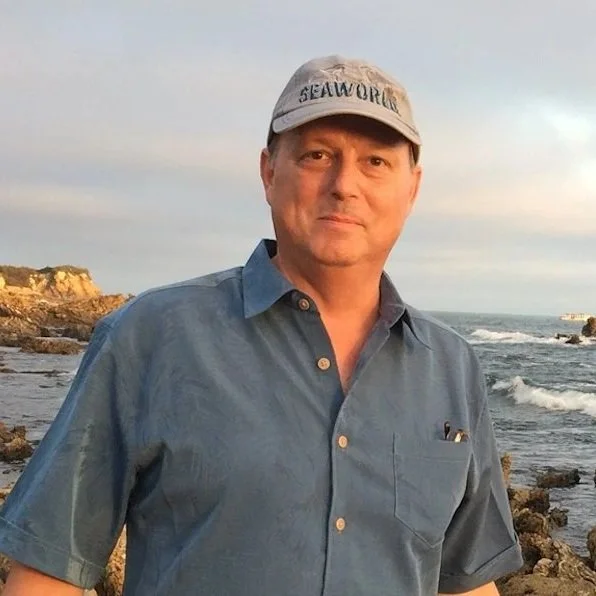
you were seagrams whiskey branding my throat and i was your
cattle. sorting you into four compartments of a stomach: from most to
least digestible. one for blurting “i love
you”, one for backhanding, “i’d love
to fuck you if you weren’t so needy”, one for boasting, “i’m in love
with the girl i ditched you for”, one for berating, “i love
it when you can’t speak.” still i would graze, as i always
had–feet grounded and eyes skyward, promising
myself tomorrow the sun would finally come
back. you would put down your pitchfork instead
of poking me with it and push your flannel sleeves up your arms instead
of into my mouth. we would watch the sunset instead
of the sunrise, fear the darkness instead
of craving it, and entwine our words instead
of twisting them. but the field we tread was soft from rot instead
of tenderness, and so i left you there, cropless, the muddy tracks
of my feet fading as i found steadier ground.


Some will say you should not. That they have families who might remember
a firm loving hand on the head, a kind look, a thoughtful gift…
Families are no distinction in this life. Indeed, small kindnesses
directed at loved ones are no distinction. Conceiving and executing
the carpet bombing of a civilian population to achieve a geopolitical
strategy—this is a distinction. Organizing and celebrating the murder
of a democratically-elected head of state—this is a distinction.
In the Museo des Bellas Artes in Santiago Chile there is a piece
of art that diagrams what might be called a blueprint of death.
Nixon (bless his death) and Kissinger (bless his death) are the arm,
drawn in grey chalk on a slate board, that directs the grim reaper’s
hand as it acts through the fingers of the security forces of Chile,
which points to the named gunmen (this is a blueprint after all)
who shot those in the street who would defend their president
in the hours before his murder and in the days before the defenders’
torture and murder in the city stadium. All I am benedicting, on this lovely
week, let’s call it “Kissinger Death Week”, where our steps are light
on an Earth no longer weighed down by great evil, is… just let me know
where his grave is. I hope it will be in Chile or Cambodia. I pray for
the digging of a pit latrine upon it. So people of peace, when they need
to relieve themselves, can do so. Because there is so little relief
from evil in this world. My plan for sacrament is to gather some roadkill
on the way, to pour some cheap Chilean wine on the carcasses,
to piss on that pile, and then to light it on fire after a sprinkle
of sulfur and napalm. The graves of mass murderers should raise
a black foul smoke—should bear the devil’s footprint for all time. Amen.

When the coach crosses the border
everything is all newsreel—
black and white,
Chamberlain, tanks, 1938.
I recall the theater tickets
I once bought for my parents—
US premier of a Vaclav Havel jot—
just after the velvet revolution.
The play was like three packs
of cigarettes smoked in a small,
dimly lit room—agitated vinegar voices
parsing arcana lost on the free.
As the grey hills roll on
my great grandfather pops to mind—
he who took a bullet somewhere in Croatia
for the glory of the Hapsburgs
in the Great War. Then house prisoner in
Russia, waiting on petty nobles until
the revolution freed him to walk
thousands of miles back to his Slovak
village to tell stories of capture,
servitude, return. What if Christine Y.,
my Dad’s mother, had not
shipped to Ellis Island in 1923?
Would I be one of Vaclav’s strange
new beasts—some kind of Eastern Euro
girlpop throbbing on the radio,
zipping American tourists from the bus
station to their swank hotels in my taxi?
It’s all a show, the bobbing
Tiki girl swinging on the dash,
the unlit cigs dangling from his lip,
begging for the big American tip…


I was working at the nice hotel on the water
that spring, trying to save enough to visit
Clara in New Haven. We had only a radio
at home, always tuned to WBJC’s evening
program, but the hotel had black and white
TVs in every room. Miss Ada told us we weren’t
allowed to watch, so I kept the volume low
enough while I changed the sheets and cleaned
the bathrooms. Sometimes, I’d sit on the edge
of an unmade bed and watch so long I had to rush
to finish the rest of my rooms. I couldn’t look away.
It was one thing to hear about something, another to see
the fists and the big police dogs. It felt a little
like the hours before a big storm hits, but maybe
that’s a bad comparison. One night, I asked
Mama what was happening, why so many people
on the TV were so upset, why so many were sitting in
diners and getting in trouble for it. She told me
she had no idea what I was talking about and asked
me to bring Daddy his nightly gin and tonic.
Later, as she cut me a slice of blueberry pie,
she told me a nice girl like me had no business
worrying about the world. Clara never thought
about that stuff, and look how happy she was.

A man with an accent that sounds fake
and a toupee that looks faker fills out
a passport form and asks the mailman
questions about local donut shops.
Which has the best glazed?
Which opens earliest?
Which has the most egregious specialty flavors?
He’s new to the area, forgive him.
A cardboard box that says “Live Animals”
tweets at uneven intervals. An occasional beak
pops out of the beak-sized holes in the box.
A stray child, not a competent adult in sight,
asks if the baby chicks have names.
The mailman doesn’t know.
Nobody asks where they came from,
where they’re going, why these chicks
are special enough to mail.
On the wall, the Twin Towers stand erect
under “Never Forget” in Times New Roman.
I think sure, yes, never forget, and then
I take a step closer so I can read the text
superimposed over the Hudson. It says,
“Share this with five of your friends to ensure
it never happens again,” and I feel a little guilty
for laughing. Maybe it’s never too soon for stupidity.
A woman bellies up to the counter. She’d like stamps.
American themed. American.
Donut World is the mailman’s favorite; maybe
the man without a passport would like it too.

Really, I could drive down to Publix right now
and buy a sheet cake, and I could carry it
back to my apartment, set it down on my desk,
lock my bedroom door, turn out the lights,
and take a fork to the cake, stuffing as much of it
into my mouth as possible, all the frosting flowers,
the sprinkles, until it becomes too much
and I have to crawl to the bathroom and throw up
the entire cake, and then I could sit there
on the moldy tile, my back against even moldier tile,
waiting for the sweat to cool off my skin,
and I could walk back to my room, and I could draw
the blinds, and I could pick up the fork again,
and I could finish the cake. That’s something
I could do. I could hit all the burger joints
on this strip, tell myself I’m running an experiment
to determine which has the best fries and chocolate
shakes. I could fill the backseat of my car
with all the wrappers and empty styrofoam cups,
the same backseat where I used to sit
and look at the stars through the sunroof
and wonder how long someone can feel
unlovable before it becomes pathological.
I could start putting French vanilla ice cream
into my coffee. I could leave a gallon of chocolate
milk on my bedside table in case I get thirsty, and when
I wake up in the middle of the night, my sheets
soaking wet and my head pounding, I could eat
an entire pack of Entenmann's, and I could wash it
down with a case of caffeine-free Coke.
That’s something I could do. I could order
a large pizza, extra cheese, and when it arrives,
I could open my front door just wide enough
for the box to fit through, and then I could drop
the whole pizza, and I could get down on my
knees and I could eat the pizza straight off the linoleum.





Wonder and calculate. Conundrum
got me scrambled. Spinning bed,
flash, black hole. Zero wiggle room
tonight, none this morning, an
agitated mind. Other trail might
be better. Heads, tails, middle;
I have needle pain. Hornet stings,
troubled yearning. Bitter anger I
want gone. I’m generating questions.
Human vehicle penetrating a thornbush.
Stage is found crumbs, they were
knocked aside and forgotten. Need
need need a goddamn answer.
Eradicate some bleak. Symptoms
boomerang meaner. I chase stability.
One step at a time. Earth weight
fluctuates, any number I skip
the dive. Random planet could
be silent, it could be even louder.
I’m here, I brought my spirit.

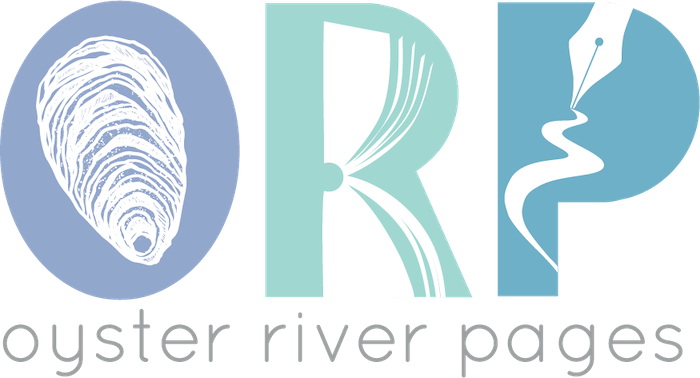
Look, Mom, he says as we drive,
pointing through the gathering
snowflakes on our window.
The trees look like a beater
with white frosting all over them.
He loves the details
which have disappeared in the rush
for most of us.
Doesn’t even have to reach
for that line,
never does.
Oooh, there’s a little toenail moon tonight.
He dreams in metaphors
and similes.
I sit in the dark
with my stacks of crumpled paper,
trying to catch
some of his dreams
as they float my way.



After Khoi the Poet’s “My Father on Protest”


When writing I try to tilt
My script to a certain degree
As if it is a sail in the wind I write
& can really see both sides of its equation
I work at a for-profit for non-profits
We are lured these days to our downtown office
With a beer tap & popcorn machine
Square packets of chex mix and granola
Where we are told things like the TEAM
Comes first & TEAM is always all—
Caps in emails, a blue-glass
Building buried into the sky
& our cameras should really always be on
While emerging from the stairs of the train
Leaves me winded sometimes
In its sweeping into the elements
The three physical therapy clinics
I pass to get to my building hold repetitious
Movements into thick walls & straps
A friend says at her workplace she likes to pretend
She is acting so for a while I say it
I’m acting, I’m acting
& it does add another dimension to the moment
A way of being more genuinely in it
Going home I pass a woman using a manual
Push mower on her square of grass
That keeps choking but she smiles
Still at me & at the big intersection
A man balances coffee & a blue gatorade
Bottle on his head


My sister’s ’63 Mustang and I were left behind
when she set off for college. Days crawled by
in my sleepy Florida town, as slowly as the rusty
freight train that rumbled through every night at 2.
Time sped up when I kicked that metal beast
into high gear, flying through orange groves,
on narrow country roads to towns even smaller
than mine. Anywhere was better than home,
where my nightgowned mother, fog-brained
on sleeping pills, would greet me after school
with taunts like, You made me sick today.
I swallowed her slurred words much like
the syrupy sweet cola stacked in the carport,
addicted to her disdain and resentments
as she was to her pills. Behind the wheel,
I was in control. As the radio blared
Little Deuce Coupe, I hit the open road shouting
the lyrics into the afternoon’s dazzling sunlight,
wind snapping my ponytail like a flag of freedom,
and raced to put distance between us.


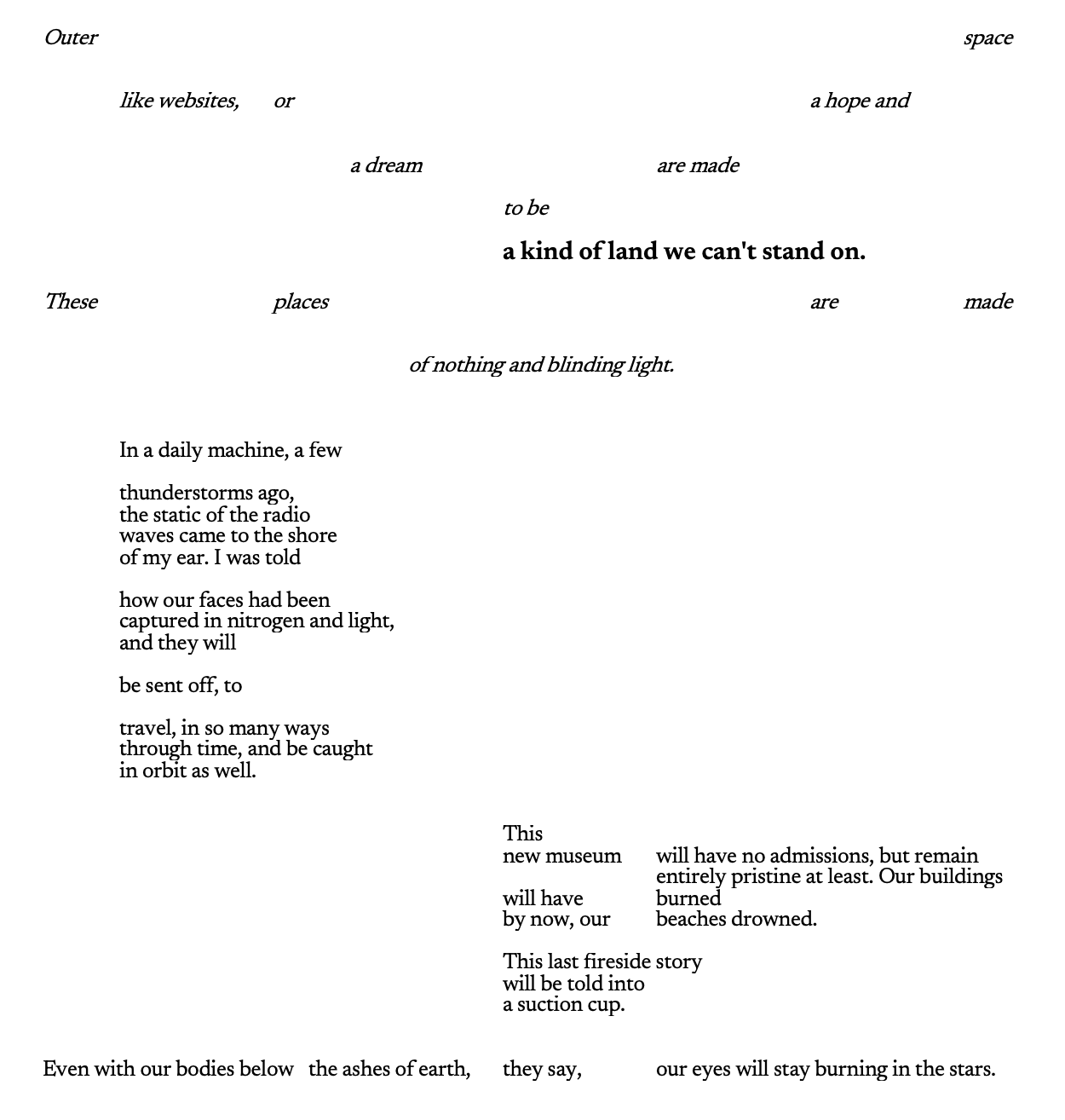


Worn memories renewed, found clues in
Kept trinkets with unique value
Leaves hidden in dim pockets
Clothes that reek of summer
Mud on my white shoes
Stray grey seashell
Tear dried tissue
Same old
Blues


I don’t believe a tattoo needs to be meaningful
in any way, but I’m getting one of an orange
next month. It’ll be my Florida tattoo, I say. A piece of home
that can sit above my knee. When I was ten,
the orange trees around us started to die from disease. Springs
spent with the car windows down, sweet, citrusy orange blossoms
blooming in our noses, disappeared in a season.
Here, a flourishing staple of our state’s natural beauty.
There, a housing development and a dollar store
and the trilling beep of construction equipment.
Yet, even as the orange trees are replaced with orange hats and vests,
I can hold the memory of the fruit on my body now
like the way I was marked by them as a child, picking
spheres too big for my growing hands from the low branches
in my great-grandparents’ yard. As I plunged my arms into the tangle
they sliced through my skin like gigi’s knife
in her kitchen cutting us neat, dripping slices we sucked with wide grins.
I want to remember what my wild Florida smelled like,
how the wind felt as we drove through
country back roads and it whipped my shiny
golden hair around my eyes. The light passed
through the strands and looked like branches blowing
in the wind if I squinted. I don’t want to have to close my eyes
to find Florida’s beauty, anymore.


Because sometimes we run out of coffee filters
and I have to take my little boy with me
out to the store and see bumper stickers
that embolden stares. And because
once I took him to the playground and saw him
pushed down and called North Korean. Because
I followed the kid back to his mother. Because
I told her what happened and she shrugged.
My entire adult life, I wore baseball caps—
hid my eyes beneath a brim of logos, always
waiting for the next thing. Because
many people around us voted for him and
because my son isn’t four anymore. Because
I need to model how to box fear, even as I expect
a punch. Awake in bed, I wonder how I’d respond.
How, if someone knocked me over, could I do it?
Could I stand up, tap my son on the back
and tell him, it’s okay, then stoop for the cap?
Could I ignore the man yelling,
his hand busted by the steel in my cheek?
Could I walk away praising the one who made me?
Putting the cap back on, would the brim hide my eyes
as I tell him love is real, as I pocket another stone?



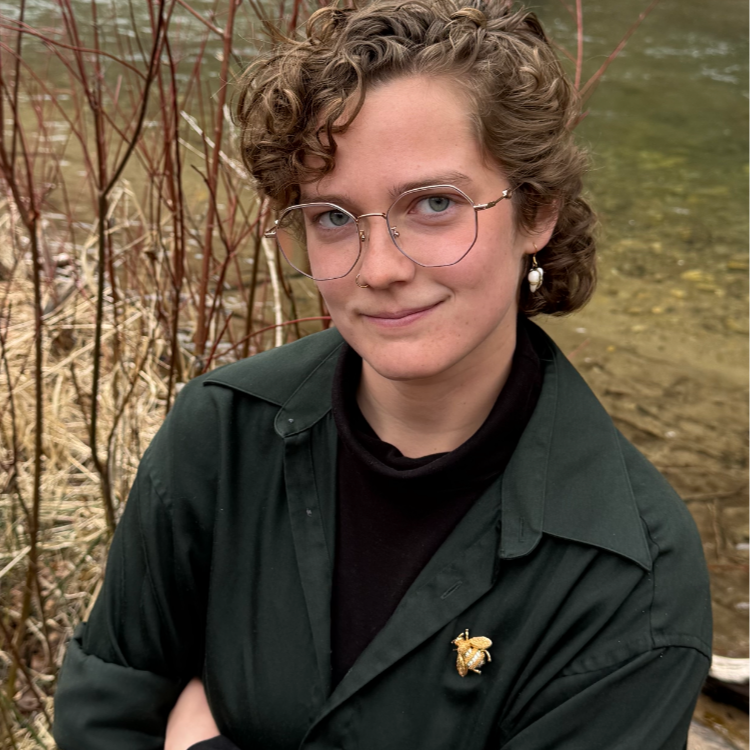
of space-time . a cartographic
and chronologic impulse with no edge
. a horizon that retreats as we pursue it
. everyone who knows the past
, is a library , is a most dangerous place
. the year after I was born
, Allen Ginsberg debuted Howl
at the now famous 1955 Six Gallery reading
, was a perfect image of protest
stepping over the hypocritical debris
of Suburbia’s nuclear family
. what now can we say
to comfort the single , Black mother
who weeps inconsolably
in the wake of the loss too large
to be held in the words
she struggles to voice . the harder we grasp
, the deeper we fall down . we euphemize
our sins while missiles spear shrapnel
elsewhere , over there and invisible
. our U . S . of ignorance , fear , bigotry
, violence and greed , despite
the folksinger whose guitar three-corded
: this machine kills fascists
. in an era of melting glaciers
, of weeping , sheared-salt tidal surges
, the climate-warmed artic ice
, out and out and out
in incremental ocean rise . the ocean fish
plastic-bloated , and burst to death
. the shit flowed unfiltered from water pipes
, and evening news awash
with flash flood stories
, and our solutions feigned as genuine
, albeit transparently marginal . the threats
we foresee , but distort , deny , are
distracted by : we still have time . and all
that is deemed improbable
, crouching in clearly favorable odds .

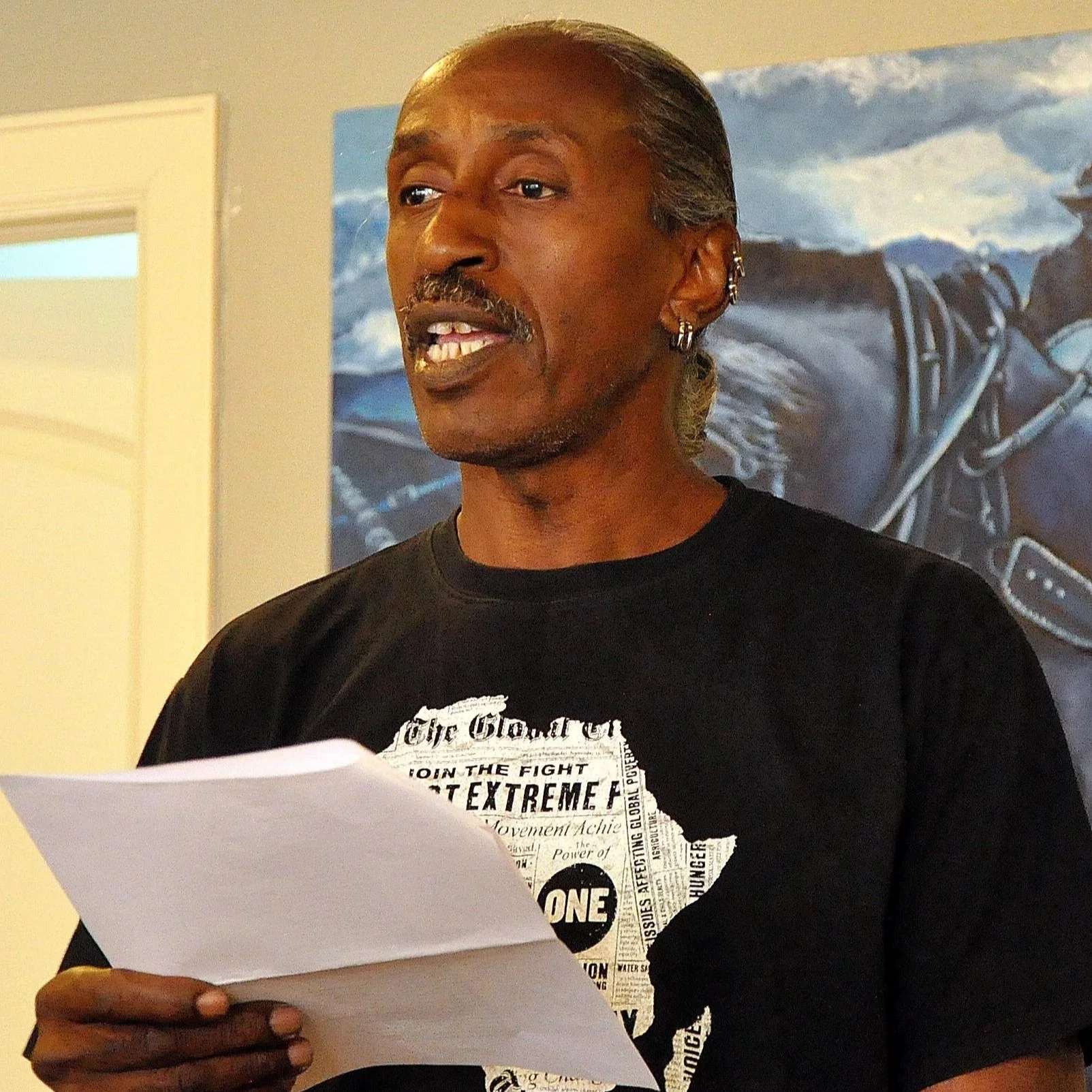
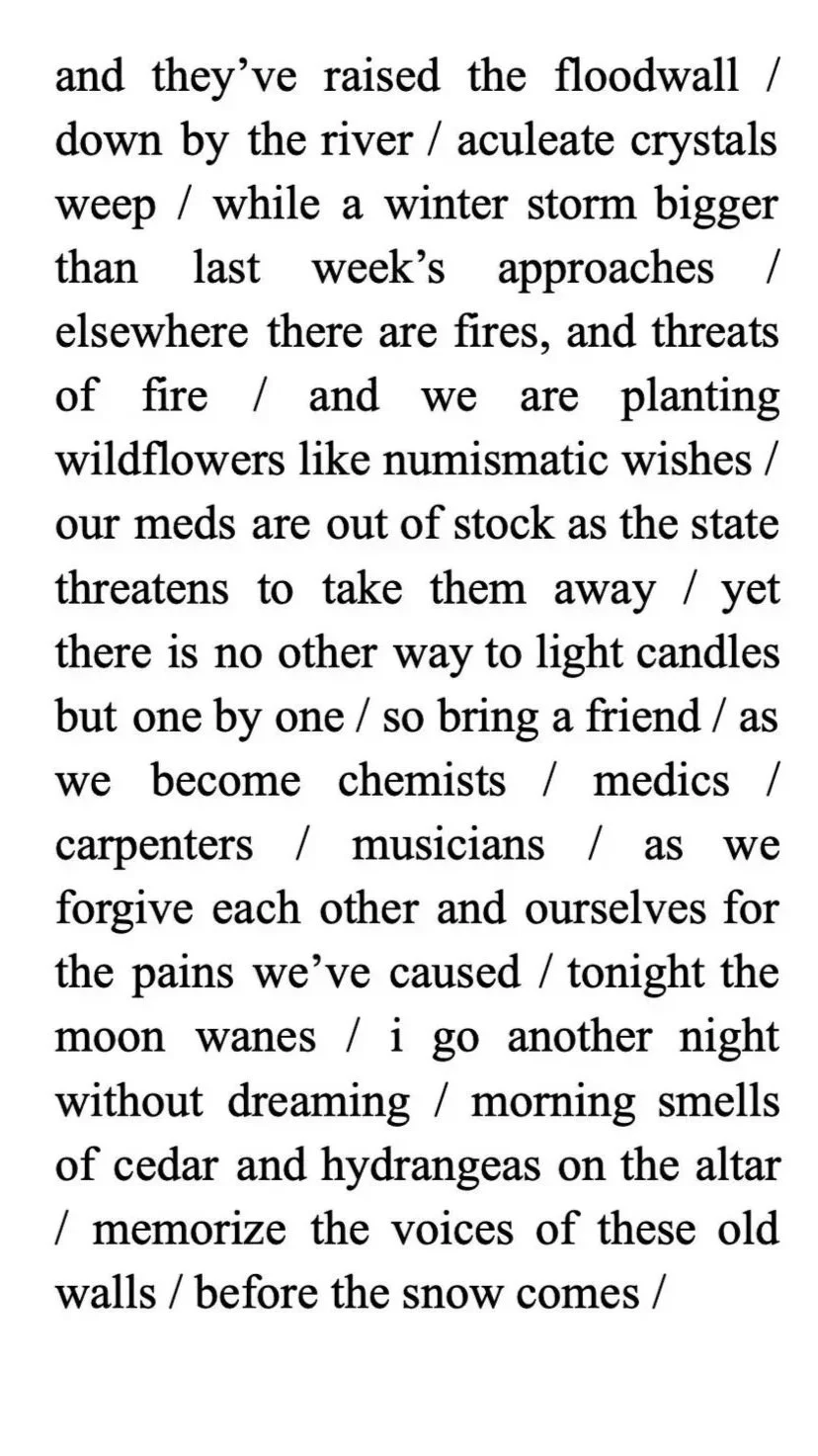

Para mi abuelo Miguel Salmorán Marín (1920-2013)
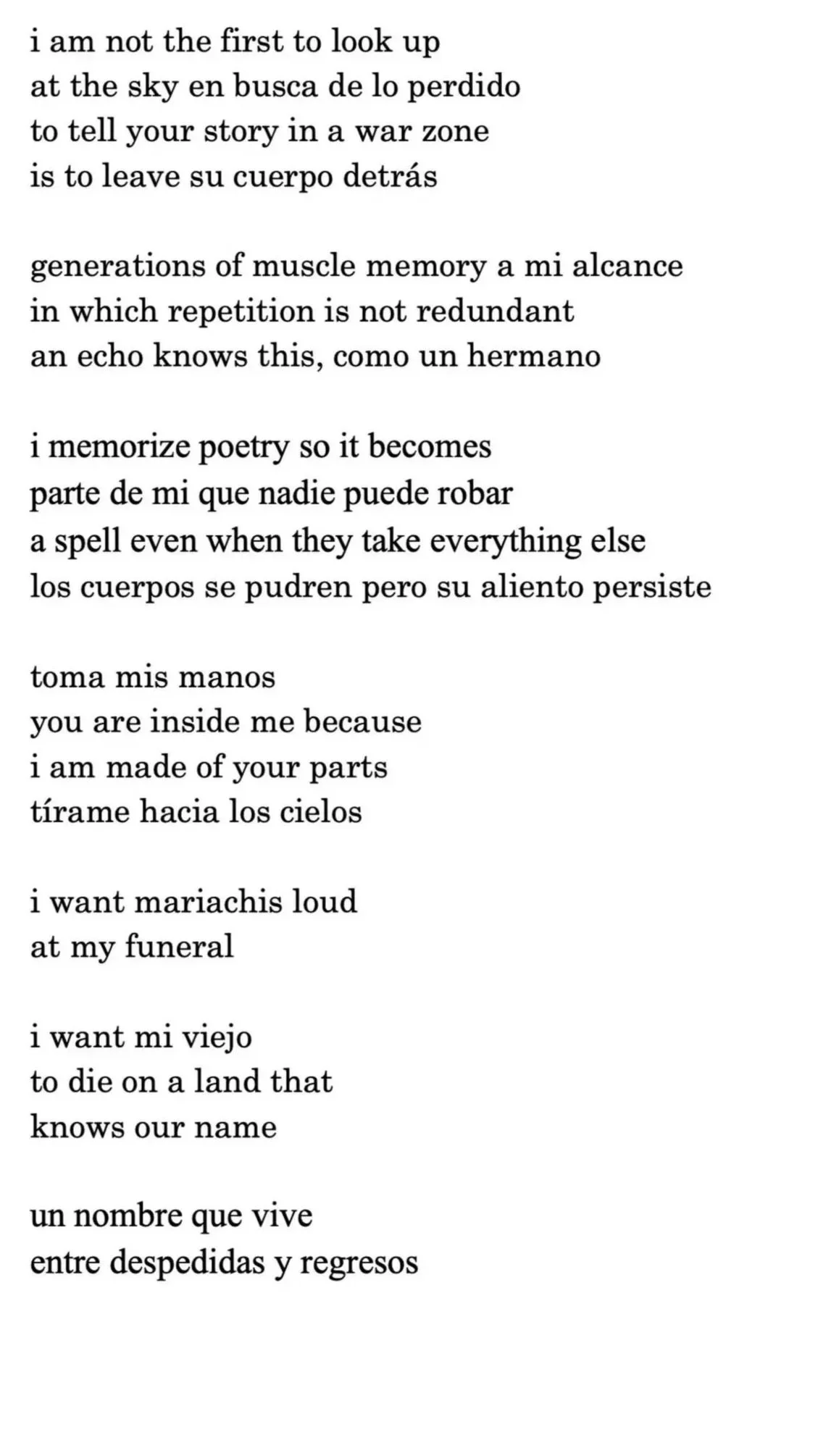

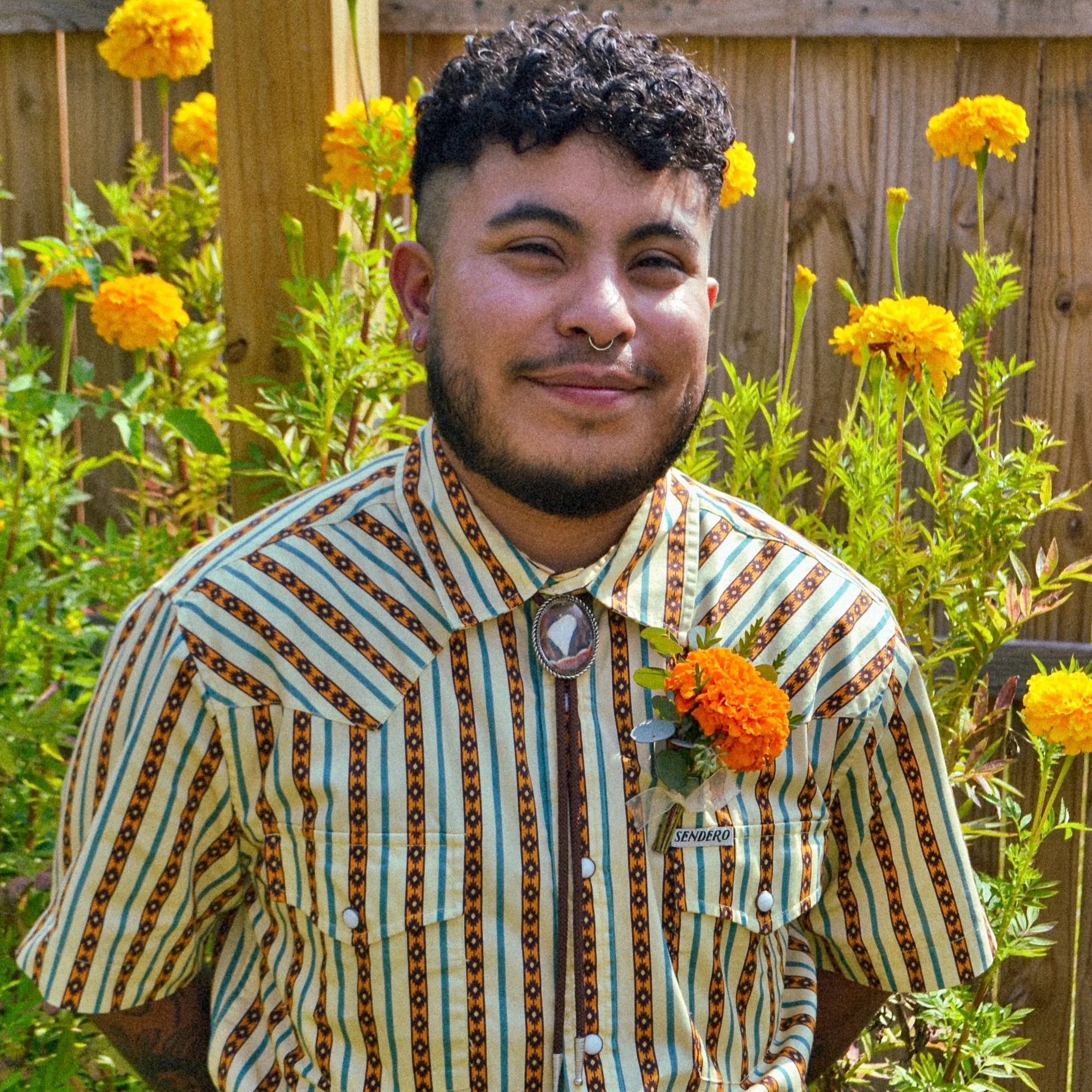
In two weeks, you will have been dead for four years.
Yesterday, we turned twenty-one. I am one long breath
away from forty. What does time mean for dead people?
Less than it means for the living, I’m sure. What is
the point of Botox if you can’t take it with you when
you go? I want to know what it feels like to be dust
without becoming dust. I want to know where you are,
but I don’t really want to know. Life is short and too long,
all in the same sigh. I went to bed sixteen and woke up
in my late twenties. I can see time unfolding in front of me
like a bridge splitting. During the Northridge earthquake
of 1994, a section of the freeway collapsed. It was early
in the morning hours when it happened. The sun hadn’t yet
come up, and a motorcyclist unknowingly drove off
the strip to his death. He couldn’t see where it ended.
You couldn’t see where it ended, either.

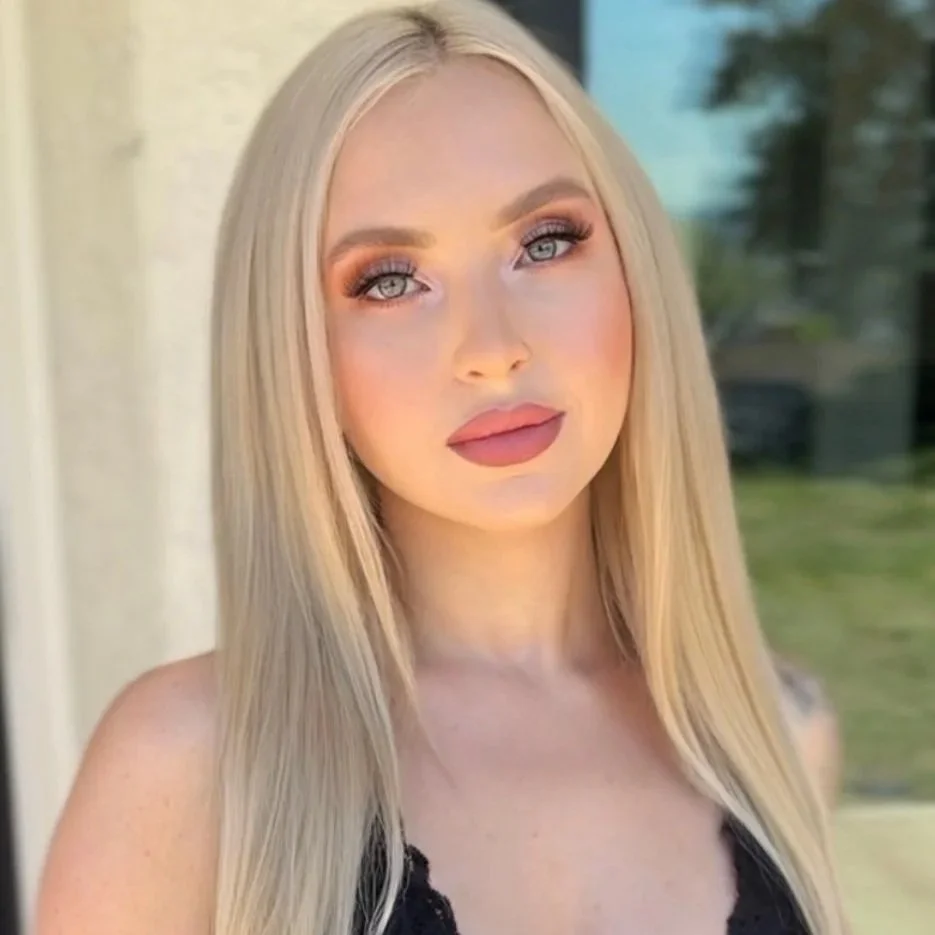
What immediately preceded Big Bang? The dictionary says bigamy. What comes after is big-brother (that reality show on CBS which was originally Dutch). I watch my bathroom mirror like TV and see someone with milky skin who is something between miracle and minutia (though surely not miracidium or minx). My skin shows Scottish origin or a scorpion clawing the center of the Milky Way. When I put on NARS red lipstick, I pucker and become Mars. Red lips, white flesh, blue eyes. A hand reaches for my heart while red lips recite one nation under God, god-child, god-daughter, goddess. Sometimes I take a Venus razor to my bikini line (the bane of my existence) and wonder about the birth of the universe and whether I really exist because of expansion. Are we sons of Adam or Atom, daughters of Eve or of Evening Star? Venus is too close to the sun to have a moon. I look like the moon during those fifteen minutes of face mask. I’m a white circle with round holes or an astral ashtray of space dust or a forlorn form floating in the vast mass of galaxy like a cosmic vagabond. I want to go back to before men (to memory?) so I can see how me came to be. Is it true that I’ve always been of unoriginal lunar origin, or is life infinite, and if it is, is it infernal? What is there after death besides deathbed— deathless? When I’m six feet under, will I find that six under surface is not sure but surprise?

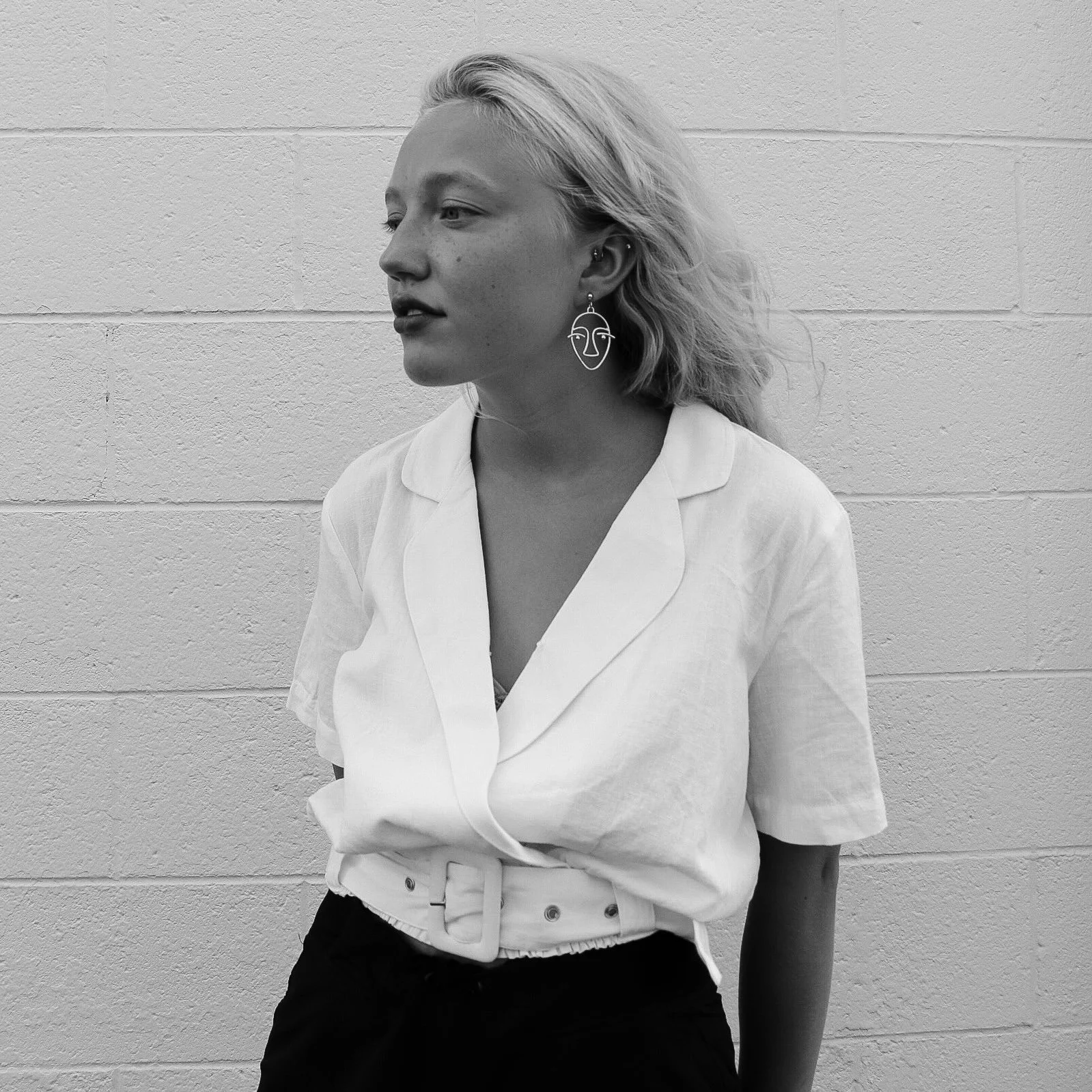





Bunny tried to feed the future a CBD drink
and couldn’t keep it down. Bunny,
sweet dumple sunset, snagging his glasses
on the strobe lights. Stratford up in flames
tonight. Hey bunny, how you doing.
You been travelling? Summer here
and your chest still a litany of pains
in your best Hawaiian shirt.
Your best friend scats as you get down
to the dark glow of the klezmer,
bunny, paws wet in beer pong cups;
bittersick, bunny, ten miles to run.
When the last guest leaves you close
your eyes and make love to the pendant lamp
then go out to break glass on the balcony,
warm your red tongue with a vape
and count the days till winter comes.
Bless your sweet boy heart, bless a world
slipped over your back like a sweater. Outside
snow hurries. Not a hint of snow.


Is it selfish to celebrate
my small victories when our liberties
could wretched away before twilight?
Grandma is nearing ninety
& the pregnant thunderheads threaten
new floods her bible cannot comprehend.
My gnarled fingers bleed still
but I’ve sculpted my melancholia
with words and barbed wire
into roses for Rose, while the fine
thread of America unravels like a cheap shirt
thrown into a washer.
My new coworker is expecting
but can’t claw her way out
of the shelter, and for her those muddy waters
claw at her neck.
I still dream: maybe one day I’ll own
a home with a verdant lawn, a virile mango
tree out back. I dream: tall bookshelves,
the musk of new paper, fresh prints.
But in that cold ghost vision
the lights don’t turn on, fridge
empty as a savings account.
No real difference between my uncle’s couch
& a king sized bed.
I dream, I dream. How many
“once in a lifetimes” warp dreams into nightmares?
There are dark times…
& then there is this.


Every time I met Tyler something would break.
His stepdad’s dirtbike, no helmets on, straining
to pull in the burnout. His chest on my chest, my
wrist in the way. The weight of my first cast. I liked
how he etched names into it, his curses and loops.
We chased streetlamps in his Acura, faces slipping
in and out of focus, my plastered arm hanging
in the darkness waiting for a cornstalk to lash at it.
My wrist still pops. I can’t sleep on my left side, rest
my arm beneath someone’s head. I liked the bleach
in his brown hair, I only bleached mine once—I didn’t
look like him, I didn’t look like I wanted to look. It’s harder
to be him, to be the one who breaks.

